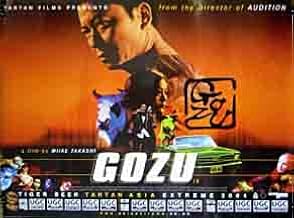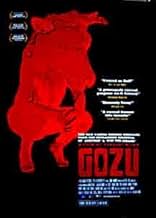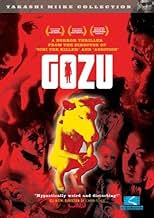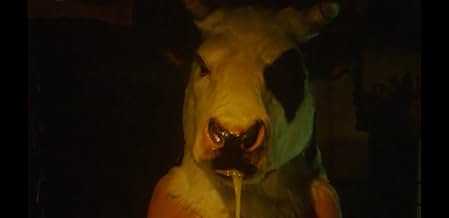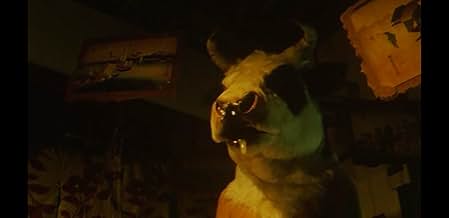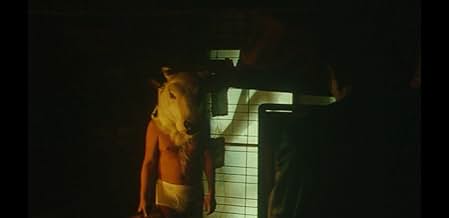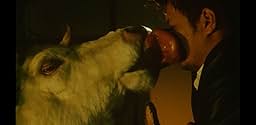AVALIAÇÃO DA IMDb
6,9/10
13 mil
SUA AVALIAÇÃO
Um executor da yakuza recebe ordens de conduzir secretamente seu amado colega para que seja assassinado. Mas quando o colega desaparece sem cerimônia no caminho, a viagem que se segue é uma ... Ler tudoUm executor da yakuza recebe ordens de conduzir secretamente seu amado colega para que seja assassinado. Mas quando o colega desaparece sem cerimônia no caminho, a viagem que se segue é uma experiência tortuosa, surreal e horripilante.Um executor da yakuza recebe ordens de conduzir secretamente seu amado colega para que seja assassinado. Mas quando o colega desaparece sem cerimônia no caminho, a viagem que se segue é uma experiência tortuosa, surreal e horripilante.
- Direção
- Roteirista
- Artistas
- Prêmios
- 5 vitórias e 4 indicações no total
Avaliações em destaque
If this is your first dive into the realm of Takashi Miike, STOP. GO BACK. REMOVE THIS MOVIE FROM YOU DVD PLAYER. You have to start somewhere less obscure than this movie. You can start out with Audition (or one of the Dead or Alive movies), follow that up with Happiness of the Katakuris and then either Ichi the Killer or Visitor Q. Once you have seen that, then you are ready to savor the flavor of this movie. To try to describe this movie would do the movie and you, the reader, an injustice. This movie just has to be watched and experienced. What can you expect from Gozu ?? Yakuzas. Killer Yakuza attack dogs. Lots of driving. Transvestites. Breast milk. Seance. Horse cropping. Sex. Birth. Ladles. The plot is based on the adventures of a yakuza made-man (Ozaki) and his underling (Minami). Ozaki is going crazy and the Boss has ordered Minami to take care of him. From there on you'll just have to watch to get the point (if there is one). As compared to his other movies, this one doesn't really have much of a story. The sheer obscureness or strangeness (and/or dark comedy) holds the various events together, linking them into a movie. At the same time, you are sitting there waiting to see how much more bizarre things can get. The movie passed by pretty quickly, with little slowdown. Fans of Miike should definitely see this movie. For everyone else, see the movie at your risk.
-Celluloid Rehab
-Celluloid Rehab
The synopsis on the DVD case compares it to something in the style of David Lynch. I would agree with that. It's definitely a surreal and strange movie. I would not rank it as high as Ichi the Killer or Audition , both of which I loved. This is Takishi Miike doing what he does best, trying to shock people but I think he's trying too hard with this movie at times to the point where it gets boring. The movie seems to loose itself in it's own strangeness at times but overall it's accomplishes what it's out to accomplish.
This movie is a nice piece of artistic filmaking and I must say that it actually made me much more uncomfortable then Ichi or Audition especially the last 30 mins or so.....watch it and you'll know what I mean.
Overall, if you are a Miike fan or a fan of David Lynch or that style of film-making then you'll appreciate this movie. If you have seen this and have not seen Ichi the Killer or Audition, do yourself a favor and go out and rent or buy those.
This movie is a nice piece of artistic filmaking and I must say that it actually made me much more uncomfortable then Ichi or Audition especially the last 30 mins or so.....watch it and you'll know what I mean.
Overall, if you are a Miike fan or a fan of David Lynch or that style of film-making then you'll appreciate this movie. If you have seen this and have not seen Ichi the Killer or Audition, do yourself a favor and go out and rent or buy those.
Another unique outing by Takeshi Miike. Way off the wall. A yakuza soldier finds himself searching for his brother (possibly dead) in a town full of lunatics and cow-headed demons. Weird Buddhist and Freudian symbols abound. One can't help but draw comparisons to David Lynch's work -- in particular Lost Highway and Mulholland Drive. I think Miike has admitted as much himself. Highly imaginative filmmmaking. My only complaint is the pacing. It's way slow for like the first hour. I had the same problem with Audition. I can appreciate the patient construction of a creepy mood, but I think Miike could step on the gas every now and then. Still, I recommend this one. It's quite a trip. There's also a fair dose of tongue-and-cheek humor in this film. (I guess it depends on one's sense of humor.)
Dog-lovers will delight in the opening scene.
Dog-lovers will delight in the opening scene.
Takashi Miike's stark, "Yakuza Horror Theatre" presentation Gozu (2003) is an infernal cinematic nightmare of fear and anxiety, played out within a sepia-toned subterranean underworld abstracted to the point of outright parody. Like many of the director's more personal and idiosyncratic pictures, the plot is largely secondary to the uncomfortable atmosphere and wild sense of spectacle presented on screen, as Miike constructs an absurd and enigmatic story of a loyal Yakuza henchman struggling with issues of homosexuality, guilt and desire when he is required by his boss to "dispose" of his mentally unstable brother in arms. This incredibly personal and moral dilemma - in which the central character must juggle the greater notions of loyalty to his boss and the loyalty to his best-friend and mentor-like figure that he's obviously quite attracted to - creates a rift within the world of the film that plunges the whole story into suffocating surrealism, horror and the absurd.
As with his other great masterworks, such as Audition (1999), Birds (2000), Visitor Q (2001) and The Happiness of the Katakuris (2001), Miike takes the story in so many continually contrasting and self-consciously abstract directions as to render any notion of a single interpretation entirely void. Instead, he bombards the audience with a seemingly endless barrage of repeatedly warped visions, uncomfortable scenarios and bursts of disarming black comedy to continually shock, amuse and perturb us into a sense of ultimate submission. Eventually, the point of the film becomes less important that the sub-textual ideas behind it and the surreal and over-the-top manner in which the director depicts it - with the tone of the film switching continually from the first scene to the last, as the absurdities of the Yakuza genre that Miike knows so well are persistently ripped-to-shreds and turned into fodder for this meta-physical, psycho-sexual conundrum.
With this in mind, it is best to approach Gozu as a prolonged nightmare, complete with personal demons and elements of religious imagery interweaving, as all notions of character and conventional narrative development are done away with in favour of an almost stream of consciousness presentation where the real, the dream and the purely metaphorical are smashed together and left in shards for the audience to reinterpret as they see fit. With Gozu, more so than any of his other recent pictures, Miike takes his personal style further than even the hall-of-mirrors-like surrealism of Audition; creating a dark and distorted recreation of a nameless Japanese underworld that is labyrinthine and claustrophobic throughout, whilst simultaneously jarring us back and forth with Buddhist symbolism, bizarre caricatures and a continual hum of aural, industrialised ambiance. The whole thing is further heightened by the glowing yellow sepia tones of the cinematography, merging with the occasional shards of red and blue lighting, the lingering shadows around the edges of the frame and the often distancing and exaggerated camera angles and choices of location.
With these factors in place, it would be easy to categorise Gozu as a horror film; however, this simply isn't the case. As with many of Miike's more iconic films, Gozu follows no singular genre or style; moving freely between the characteristics of illogical comedy, knock-about buddy picture, gritty Yakuza-thriller, unrequited romance and psychological horror story seemingly simultaneously. Obviously, when we take this approach into consideration, Gozu won't be the kind of film that appeals to everyone, with a certain interest and familiarity with Miike as a filmmaker required by the audience to really appreciate the sense of humour and the continual shifts in tone. Even then, multiple viewing will be needed for the audience to fully digest the film's central message and layers of potential interpretation. However, it's definitely worth it, especially for anyone with a keen interest in the work of similarly minded filmmakers like David Lynch, Terry Gilliam, Sogo Ishii, Ken Russell, David Cronenberg and Shinya Tsukamoto.
Gozu takes the surreal horror and ambient farce of films like The Happiness of the Katakuris and Visitor Q to the next conceivable level of cinematic deconstruction, self-reference and meta-textual despair; as we literally submerge ourselves in a homosexual love story played out against a self-aware purgatory-like construction, rife with the allusions to the filmmakers aforementioned, and further applied alongside the desolate use of landscapes, jarring shifts from parody to horror and the freewheeling structure of the narrative itself. Combined with the fine performances from Hideki Sone, Kimika Yoshino, Tetsurô Tamba and Miike regulars Sho Aikawa and Renji Ishibashi, Gozu is easily one of its directors best and most unique endeavours; an arch, dead-pan, deranged and often dangerous sub-textual trawl through one man's despair and Freudian confusion dressed up as a post-apocalyptic fable of ridiculous gangster theatrics, role playing, gender metamorphosis and pure, existentialist angst.
As with his other great masterworks, such as Audition (1999), Birds (2000), Visitor Q (2001) and The Happiness of the Katakuris (2001), Miike takes the story in so many continually contrasting and self-consciously abstract directions as to render any notion of a single interpretation entirely void. Instead, he bombards the audience with a seemingly endless barrage of repeatedly warped visions, uncomfortable scenarios and bursts of disarming black comedy to continually shock, amuse and perturb us into a sense of ultimate submission. Eventually, the point of the film becomes less important that the sub-textual ideas behind it and the surreal and over-the-top manner in which the director depicts it - with the tone of the film switching continually from the first scene to the last, as the absurdities of the Yakuza genre that Miike knows so well are persistently ripped-to-shreds and turned into fodder for this meta-physical, psycho-sexual conundrum.
With this in mind, it is best to approach Gozu as a prolonged nightmare, complete with personal demons and elements of religious imagery interweaving, as all notions of character and conventional narrative development are done away with in favour of an almost stream of consciousness presentation where the real, the dream and the purely metaphorical are smashed together and left in shards for the audience to reinterpret as they see fit. With Gozu, more so than any of his other recent pictures, Miike takes his personal style further than even the hall-of-mirrors-like surrealism of Audition; creating a dark and distorted recreation of a nameless Japanese underworld that is labyrinthine and claustrophobic throughout, whilst simultaneously jarring us back and forth with Buddhist symbolism, bizarre caricatures and a continual hum of aural, industrialised ambiance. The whole thing is further heightened by the glowing yellow sepia tones of the cinematography, merging with the occasional shards of red and blue lighting, the lingering shadows around the edges of the frame and the often distancing and exaggerated camera angles and choices of location.
With these factors in place, it would be easy to categorise Gozu as a horror film; however, this simply isn't the case. As with many of Miike's more iconic films, Gozu follows no singular genre or style; moving freely between the characteristics of illogical comedy, knock-about buddy picture, gritty Yakuza-thriller, unrequited romance and psychological horror story seemingly simultaneously. Obviously, when we take this approach into consideration, Gozu won't be the kind of film that appeals to everyone, with a certain interest and familiarity with Miike as a filmmaker required by the audience to really appreciate the sense of humour and the continual shifts in tone. Even then, multiple viewing will be needed for the audience to fully digest the film's central message and layers of potential interpretation. However, it's definitely worth it, especially for anyone with a keen interest in the work of similarly minded filmmakers like David Lynch, Terry Gilliam, Sogo Ishii, Ken Russell, David Cronenberg and Shinya Tsukamoto.
Gozu takes the surreal horror and ambient farce of films like The Happiness of the Katakuris and Visitor Q to the next conceivable level of cinematic deconstruction, self-reference and meta-textual despair; as we literally submerge ourselves in a homosexual love story played out against a self-aware purgatory-like construction, rife with the allusions to the filmmakers aforementioned, and further applied alongside the desolate use of landscapes, jarring shifts from parody to horror and the freewheeling structure of the narrative itself. Combined with the fine performances from Hideki Sone, Kimika Yoshino, Tetsurô Tamba and Miike regulars Sho Aikawa and Renji Ishibashi, Gozu is easily one of its directors best and most unique endeavours; an arch, dead-pan, deranged and often dangerous sub-textual trawl through one man's despair and Freudian confusion dressed up as a post-apocalyptic fable of ridiculous gangster theatrics, role playing, gender metamorphosis and pure, existentialist angst.
Takashi Miike is a very strange man - I think there's sufficient evidence of that fact that I need not justify it further. So if I tell you that GOZU is probably Miike's weirdest film to date, you will know that we are talking some world-class oddity. Billed as a "Yakuza Horror" film, which is a label that just about fits if you consider that Japanese horror films have always shown a very different sensibility than Hollywood films (Japanese horror is generally of a quite intangible nature, about the horror of the unknown and the incomprehensible - not so much about the big scary monsters). GOZU is interesting in that the "horror" of it comes almost entirely from the way it is filmed - the camera work, the editing and the sound effects all come together to create a sense of foreboding and fear that for the most part is not at all born out by the actual events in the film. Miike is probably making the point that most horror films are just exercises in film-making technique these days, rather than presenting truly frightening content. Or perhaps he just fancied a way to make his latest Yakuza film a little bit different :)
Miike is definitely one of the most creative film-makers working in the world today - quite possibly *the* most, given his insanely prolific output and the fact that almost every film he makes manages to be unique and memorable. Doing that with one film a year would be an impressive feat, and Miike gives us at least 3-4 such films every year. GOZU shows him on fine creative form once more, turning a story that probably isn't all that interesting into a surreal, dreamlike experience. The plot itself is very minimal, and largely irrelevant for most of the 125 minute running time. Basically, a Yakuza is told to take his yakuza-brother (Sho Aikawa) to an out of the way part of Japan and get rid of him, as he been showing signs of going a bit loopy. However, before he can carry out his orders, Aikawa disappears - and most of the rest of the film is concerned with Minami's efforts to find him. But that description really sells short the content of the film, which is really about the strange characters he encounters and the even stranger experiences that he has.
Going into more detail about what happens wouldn't add a lot to this review, so I won't. Just be prepared to "go with the flow" and see what the film has to offer, rather than expecting anything specific from it. Don't expect a nice neat resolution at the end, either, 'cause you'll definitely be disappointed. Miike's films are often films that need to be seen in just the right mood to be enjoyed, and I'm glad I made the decision that my mood wasn't right when I started watching GOZU 6 months ago. The film sat there waiting for me until this weekend, when I figured the time was as good as it was going to get, and it paid off in spades :)
Miike's films often suffer on repeat viewings, and I am pretty sure this will be true of GOZU - at over 2 hours it is definitely too long, and there are sure to be scenes that are a bit of a chore to sit through when you know what's coming. I couldn't say which scenes they are from a first viewing though, so there's nothing that's truly redundant in there, and I hope that the US distributors that recently acquired the film will remember that their viewers would rather make the decision themselves about any scenes that weren't needed. i.e. uncut, please!
Miike is definitely one of the most creative film-makers working in the world today - quite possibly *the* most, given his insanely prolific output and the fact that almost every film he makes manages to be unique and memorable. Doing that with one film a year would be an impressive feat, and Miike gives us at least 3-4 such films every year. GOZU shows him on fine creative form once more, turning a story that probably isn't all that interesting into a surreal, dreamlike experience. The plot itself is very minimal, and largely irrelevant for most of the 125 minute running time. Basically, a Yakuza is told to take his yakuza-brother (Sho Aikawa) to an out of the way part of Japan and get rid of him, as he been showing signs of going a bit loopy. However, before he can carry out his orders, Aikawa disappears - and most of the rest of the film is concerned with Minami's efforts to find him. But that description really sells short the content of the film, which is really about the strange characters he encounters and the even stranger experiences that he has.
Going into more detail about what happens wouldn't add a lot to this review, so I won't. Just be prepared to "go with the flow" and see what the film has to offer, rather than expecting anything specific from it. Don't expect a nice neat resolution at the end, either, 'cause you'll definitely be disappointed. Miike's films are often films that need to be seen in just the right mood to be enjoyed, and I'm glad I made the decision that my mood wasn't right when I started watching GOZU 6 months ago. The film sat there waiting for me until this weekend, when I figured the time was as good as it was going to get, and it paid off in spades :)
Miike's films often suffer on repeat viewings, and I am pretty sure this will be true of GOZU - at over 2 hours it is definitely too long, and there are sure to be scenes that are a bit of a chore to sit through when you know what's coming. I couldn't say which scenes they are from a first viewing though, so there's nothing that's truly redundant in there, and I hope that the US distributors that recently acquired the film will remember that their viewers would rather make the decision themselves about any scenes that weren't needed. i.e. uncut, please!
Você sabia?
- CuriosidadesThe store-owner's American wife knew no Japanese, and had to read her lines phonetically off cue cards posted above her head. She proved to be absolutely hopeless at anything resembling proper pronunciation or competent acting. Director Takashi Miike found the result interesting and displayed the cards for a simultaneously eerie and comedic effect.
- ConexõesFeatured in Horror's Greatest: Japanese Horror (2024)
Principais escolhas
Faça login para avaliar e ver a lista de recomendações personalizadas
Detalhes
- Data de lançamento
- País de origem
- Central de atendimento oficial
- Idioma
- Também conhecido como
- Yakuza Horror Theater: Gozu
- Locações de filme
- Empresas de produção
- Consulte mais créditos da empresa na IMDbPro
Bilheteria
- Faturamento bruto nos EUA e Canadá
- US$ 58.202
- Fim de semana de estreia nos EUA e Canadá
- US$ 5.030
- 1 de ago. de 2004
- Faturamento bruto mundial
- US$ 58.633
Contribua para esta página
Sugerir uma alteração ou adicionar conteúdo ausente



